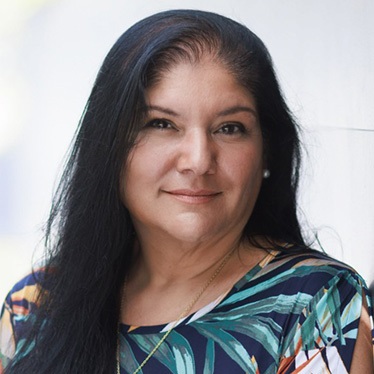Online EMPA experience converges with pandemic response
May 20, 2020
 The World Health Organization declared the rapidly
spreading coronavirus outbreak a pandemic on March 11, jolting Natalie Aguilera into plans for the Native American Health
Center in Oakland, California, to prepare and respond. A few weeks later, as
the global health crisis was spiraling across the United States, Aguilera
started the Maxwell School’s Online Executive MPA program.
The World Health Organization declared the rapidly
spreading coronavirus outbreak a pandemic on March 11, jolting Natalie Aguilera into plans for the Native American Health
Center in Oakland, California, to prepare and respond. A few weeks later, as
the global health crisis was spiraling across the United States, Aguilera
started the Maxwell School’s Online Executive MPA program.
A course in managerial leadership is proving especially relevant. “It’s opening my eyes in real time,” said Aguilera, who has worked at the health center for 15 years and was promoted to chief administrative officer 18 months ago. “I’m hearing theoretical frameworks and new ways of structuring things. It’s helping me think about the work I’m doing every day.”
Aguilera is among many Online Executive MPA students and alumni with jobs responding to the pandemic. Roles include a police chief working with the homeless and providing security at hospitals, director of emergency management, director of a rural health center, security director at Baltimore’s Johns Hopkins University and a member of the Minnesota Army National Guard.
“These are folks who are clearly passionate about serving the public good,” said Nell Silva Bartkowiak, Online EMPA program director.
Aguilera oversees the Oakland clinic’s human resources, IT, compliance, facilities and development departments. “HR has been hit very hard because the laws changed so frequently,” she said. Converting walk-in behavioral health and social services to telehealth, for example, required updates to reflect new insurance reimbursements.
“Our Native and urban population is underserved, and they’re hit harder because they have fewer resources or have underlying conditions,” said Aguilera, a member of the Oklahoma Choctaw Nation. “It was scary to know they might be hit harder.”
The speed at which the crisis affected American life required her staff to be nimble and creative. “It would have taken us long to make changes in the past,” she said. “We were making changes almost in real time.”
Starting the EMPA program during the COVID-19 crisis has helped her focus on her priorities at Maxwell. “I want to learn how to communicate better, both in administrative operations and externally to advocate for our clients,” she said.
 For Brandie Andrews, the pandemic provides a case
study in the intersection of public and private organizations. She’s worked for
14 years for AIR Worldwide, a catastrophe modeling and data analytics company in
Boston.
For Brandie Andrews, the pandemic provides a case
study in the intersection of public and private organizations. She’s worked for
14 years for AIR Worldwide, a catastrophe modeling and data analytics company in
Boston.
The company’s pandemic team was already running models by February, “They knew all the signs and knew this could be a really impactful event worldwide,” said Andrews, who completed the Online EMPA program in March.
A project with FEMA on the National Flood Insurance Program sparked her interest in the Maxwell Executive Education program. “I noticed the problems actuaries had had nothing to do with math or statistics, but politics,” she said. She wanted to learn “how to be more engaged in my government and how public and private entities could work together.”
Andrews helps clients understand regulations about how the company’s models are used. States, the Congressional Budget Office and financial rating agencies like Fitch and Standard & Poor’s are studying AIR’s models to predict the pandemic’s impact on business and the economy.
“One of the unexpected outcomes of my Maxwell education was learning the language of what government is all about,” she said. “I have empathy for the struggles and tradeoffs public administrators are having in a crisis. I now know a little better what is going right.”
05/20/20
Related News
School News

Dec 19, 2024
School News

Dec 11, 2024
School News

Dec 10, 2024
